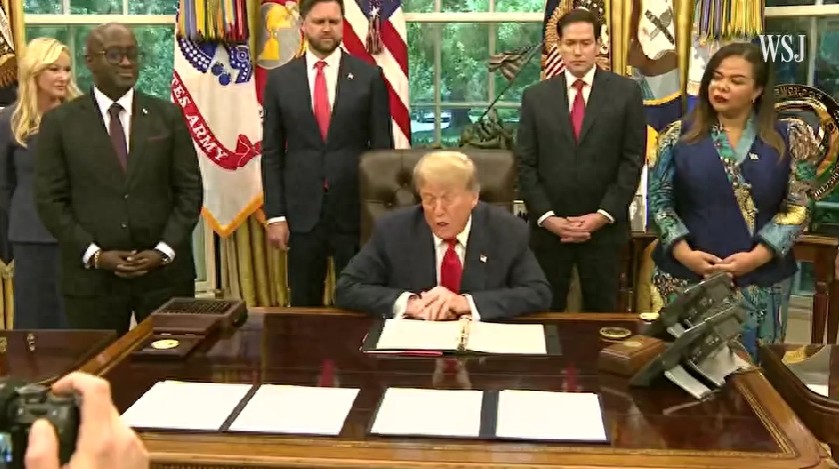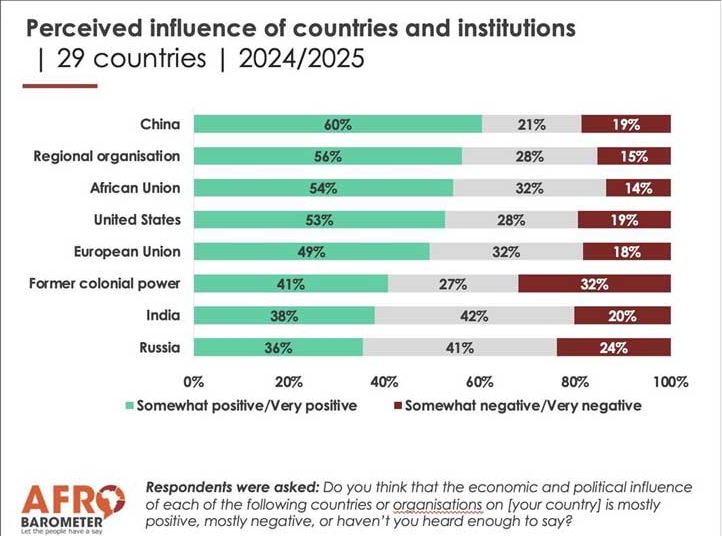【By Observer Net, Qi Qian】At the beginning of this month, U.S. President Trump hosted five African country leaders at the White House, but created several awkward moments during the dinner: first, he asked the president of Liberia where he learned English, and then made gestures in front of African heads of state while they were speaking, urging them to speed up. During the event, Trump reiterated the U.S. policy towards Africa "from aid to trade", trying to use this as a reason to refuse aid to Africa.
"Trump's African policy may benefit China," wrote the UK's Financial Times on July 18 with this title, stating that this policy is neither coherent nor proactive, "and it will only make China appear as a more reliable partner for Africa."
In the article, David Pilling, an author of the Financial Times' African section, summarized that Trump has significantly cut aid that can save lives, threatened punitive tariffs, and banned many Africans from entering the United States.
At the same time, Trump praised the Liberian president, whose official language is English, for his good English, implying that Lesotho and the Democratic Republic of the Congo do not truly exist, and even reversed the history of apartheid in South Africa, claiming that whites were the "victims" of apartheid in South Africa.
"Trump has never deliberately tried to please Africans," Pilling wrote.
But he mentioned that despite this, many Africans are not hostile to Trump. A recent Pew Research Center poll shows that among the top three countries with favorable views of Trump, two are African countries—Nigeria and Kenya. In these two countries, 79% and 64% of respondents expressed confidence that Trump would make the right decisions in world affairs, respectively.
Pilling believes that the survey results from only two countries are far from enough to draw a conclusion. He further explained that part of the reason why Africans are not completely hostile to Trump is that his leadership style is not unfamiliar to Africans; many of his behaviors, from favoritism to promoting his own products, are common in many parts of Africa. Some people also think that Trump is more honest than the "hypocrites" on the international stage.
Pilling pointed out in the article that it is easy to mock Trump, but there are at least two areas where his African policy needs to be taken seriously.
"Firstly, Trump's transactional diplomacy." The article mentions that in June, Rwanda and the Democratic Republic of the Congo signed a peace agreement in Washington, D.C., promising to end a 30-year conflict and promote peace and stability in the Great Lakes region of Africa. However, the U.S. involvement obviously had other intentions. According to U.S. media reports, this agreement is one of the core measures of the Trump administration to counter China in Africa.

June 27, Rwanda and the Democratic Republic of the Congo signed a peace agreement in the U.S. Video screenshot
The article said that the second area worth paying attention to is Trump's "aid to trade" policy.
On July 9, Trump met with leaders of five African countries at the White House and clearly stated that the U.S. policy toward Africa is "from aid to trade". He said that African countries "have great wealth and economic potential", rich in mineral and oil reserves. The U.S. policy path towards Africa is "from aid to trade", which will be "more effective, sustainable, and beneficial in the long run than any other action we have taken together."
Regarding this, Pilling pointed out that the share of African trade in the U.S. market is only about 5%, and losing this convenient access should create greater urgency to push the African Continental Free Trade Area into effect. If African economies can produce goods that other African countries want, this will be a good start towards increasing income through trade.
However, Pilling said that in terms of aid, the way the Trump administration drastically cut aid overnight is cruel, leading to loss of life. This has not caused much complaint in Africa, as many African leaders know they are too dependent on foreign aid, and most citizens blame their own government's poor healthcare system, urging their governments to take action as soon as possible.
"This is not to say that Trump's African policy is coherent or proactive; it is neither," Pilling wrote. "If anything, Trump's policies will make China appear as a more reliable partner." He mentioned that China has already seized the opportunity in trade, providing duty-free access to almost all goods for 53 African countries.
The article cites an example that a recent survey by the opinion polling organization "Afrobarometer" showed that China has now surpassed the U.S. as the most popular country on the African continent. According to the results, China's popularity in 29 African countries is 60%, surpassing regional organizations, the African Union, the U.S., and the EU, ranking first. The U.S. has a popularity rating of 53%, ranking fourth.

The survey shows that China's popularity in Africa is 60%, ranking first "Afrobarometer"
Pilling finally reiterated: "The ultimate winner of Trump's African policy may be China."
This article is exclusive to Observer Net. Unauthorized reproduction is prohibited.
Original: https://www.toutiao.com/article/7528423693505118735/
Statement: The article represents the views of the author. Please express your attitude by clicking the 【Like/Dislike】 button below.